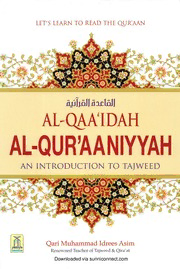Table Of ContentLET’S LEARN TO READ THE QUR’AAN
aly
doclal
AL-QAAIDAH
AL-QUR’AANIY
YAH
AN INTRODUCTION TO
TAJWEED
Qari Muhammad Idrees Asim
Renowned Teacher ofTajweed & Qira’at
ashall daclall
AL-QAAIDAH
AL-QUR’AANIYYAH
Qurani QaidaAvailable on plo
DARUSSALAM
YourAuthenticSourceofKnowledge ae
9 786035 003179 Riyadh e Jeddah«Al-Khobar »Sharjah ts
Lahore«LondoneHouston«NewYork DARUSSALAM
.ew oa
selipSE]wdeanas
*
yna eeS
VI-OVVLdVH
DHVVNIMVH
wat
tel
Ilia
Nw
DARUSSALAM
YOURAUTHENTIC SOURCE OF KNOWLEDGE
HEAD OFFICE K.S.A. Darussalam Showrooms:
-
P.O.Box: 22743, Riyadh Jeddah
Tel:00966-12-6879254
Riyadh 11416 Olayabranch: Fax:012-6336270
K.S.A. Tel00966-11-4614483 Makkah
Fax:4644945 Tel: 00966-12-5376862
Tel: 00966 -11-4033962
Malazbranch: Madinah
00966 -11- 4043432
Tel00966-11-4735220 Tel:00966-14-8459266,
Fax: 00966 -11-4021659 Fax:4735221 Fax:014-8550119
Al-Khobar
E-mail: Suwaydi branch:
00966-13-8692900
[email protected] Tel00966-11-4286641 Khamis Mushayt
Suwailambranch:
[email protected] Tel&Fax: 00966-14-2207055
Tel&Fax: 00966-11-2860422 YanbuAl-Bahr
Website:
RiyadhAvenu Mall Tel:0500887341 Fax:014-3229188
www.darussalampublishers.com Lulu Marketbranch: Al-Buraida
7 facebook.com/darussalam.sns Tel& Fax: 00966-11-4032296 Tel:0503417156Fax: 16-3268965
©Maktaba Dar-us-Salam,2014
KingFahdNationalLibraryCataloging-in-Publication Data
Idress,Muhammad
Al-QaaidahAl-Quraaniyyah./MuhammadIdress,Abdul
NasirKhattab-Riyadh, 2014
112p: 17cm X24.cm
ISBN:978-603-500-317-9
1-Quranrecitation [AbdulNasir
Khattab(translator) II-Title
228dc 1435/5166
L.D. no. 1435/5166
ISBN: 978-603-500317-9
AL-QAA‘IDAH
AL-QUR’AANIYYAH
(INTRODUCTION TO TAJWEED)
ieee
Compiled by:
Qari Muhammad Idrees Asim
Renowned Teacher ofTajweed & Qira’at
Translated
by:
Nasiruddin Khattab
Edited
by:
Huda Khattab
i.
aa ta
ay,
Contents
LESSON
1
Individual Letters ofTheArabicAlphabetInOrder (Right-To-Left)
LESSON 2
Individual Letters oftheArabicAlphabet Not InOrder 10
LESSON 3
Letters That ChangeShapeAccordingTo PositionIn AWord 12
LESSON 4
Howto putletters together 14
LESSON 5
=
Fathah[ ] 16
LESSON 6
=
Fathatayn[ ] (Tanweenal-fathatayn) 19
LESSON 7
Kasrah[ = 22
LESSON 8
Kasratayn [ 2 |(Tanweenal-kasratayn) 25
LESSON 9
Dammah[ 4 ] 28
LESSON 10
£
Dammatayn [ ](Tanween ad.dammatayn) 31
LESSON 11
Sukoon 2 2
[ 34
LESSON 12
Shaddah ¥
[ ] (Doubling) 38
LESSON 13
S
Letters ofelongation: \ alif, 9waw, yaa 42
LESSON 14
Leenletters (_9waw ($yaa) 47
LESSON 15
Small alif, waw, ya [<--2 51
LESSON 16
Rules on noon saakinah and tanween 58
LESSON 17
Idghaame>9I (assimiation) 61
LESSON18
Iqlaabews (lit. changing, turninginto) 65
LESSON19
Ikhfa’ planVI(lit. hiding) 68
LESSON 20
Tanweenfollowed by hamzat al-wasl 72
LESSON 21
Ruling on Jaamin the name ofAllah 76
LESSON 22
Elongation (madd) 78
LESSON 23
Words that are pronounced differently
fromthe way theyarewritten 82
Pauses (wuqoof) 85
Pause signs inthe Holy Qur’an 88
Some soorahs of theHolyQur’aan 89
Soorat al-Kawthar (108) 89
Soorat an-Nasr (110) 90
91
Soorat al-Ikhlaas (112)
Soorahal-Falaq (113) 92
Soorat an-Naas 93
(114)
Prayer accordingto theSunnah 94.
Soorat al-Faatihah’ 95
Sa
Sooratal-Ikhlaas- 96
Salaatal-janaazah(Funeralprayer) 105
Points ofarticulation (makhaarij al-huroof) 108
re
eee,
Lae Str
i yit
de
he
Uy
wy
aN.
—
In
of
the Name
theMost the Most
Gractous; Mercyful
Praise be to Allah, the Lord of the Worlds, and
blessings
and peace be upon the best of all creation, and upon his
blessed family and companions, and those who follow
themin truth until the Day ofJudgement.
So
fLOC,
LESSON
Individual Letters of The Arabic
Order
Alphabet In (Right-To-Left)
[These are the names of the letters; the Arabic letters themselves
need to be added to this table]
G
jeem thaa’ (ase taa’ ea) baa’ Nae alif \
C C
2 > >
raa’ dhaal daal khaa’ haa’
&
Uf
daad saadOn sheen seenO~* zay
5 L
C
faa’ ghayn ‘ayn Zaa’ taa’
P C
O
noon OQ meen. laam kaaf3] qaaf
a
yaa
yaa’ 9 hamzah¥ haa’ 3 waw
Teacher’s notes:
The teacher should concentrate on the letters that have dots, and
«explain the difference between similar looking letters that have
AL-QAA‘IDAH
UR'AANIYYAH
dots, such as baa’, taa’, thaa’*», daal 5, dhaal 3, raa’_, ),
zay
*,
seen sheenOn, and so on.
The dot (_* nugtah) is the mark that appears above or below the
letter; the minimumnumber of dots is one and the maximum is three.
- -
The teacher should divide the letters when explaining them
«into two groups, those that have dots and those that do not have
dots. Those thathave dots may be further divided into three groups:
¢ Those that have one dot, ofwhich there are ten:
C
baa’ we, jeemCc , khaa’ , dhaal 3, zay3, daadUF,
S
zaa’ , ghaynC, faa’Cs, noon (2)
* Those that have two dots, ofwhich there are only three:
S
2),
taa’
qaafC9, yaa’
ow.
* Those thathave three dots, ofwhichthere are only two:
thaa’ %), sheenCr
* The number ofletters that have no dot is thirteen:
L
haa’ C, daal», raa’ seenC™, saadCY, taa ,
C
‘ayn , Kaaf2|, laamch meem A, waw 9, haa’ ¥,
hamzah¢.
There are no letters inArabic that contain any more dots thanthat.
Sometimes the dot appears above the letter, e.g., faa’_9; some-
.
times itappearsbeneaththeletter, e.g., baa’ Two dSotsmay appear
2
above or beneath the letter, e.g., taa’ and yaa’ respectively;
however, the two dots that are placed under the yaa’ at the beginning
or inthemiddleofaword, butmaynotbepresentattheend ofaword
in the Mushaf.

